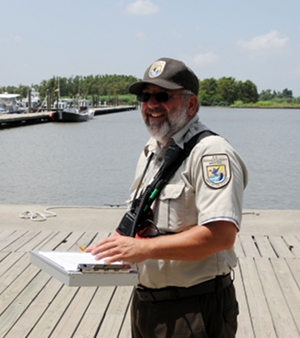 |
Steve Hollywood Mierzykowski, a Biologist from the U.S. Fish and Wildlife Service, Northeast Region, Ecological Services Field Office in Orono, Maine.
|
Ask a Responder: Q&A with the Venice Boat Group Boat Coordinator
Steve Hollywood Mierzykowski is a Biologist from the U.S. Fish and Wildlife Service, Northeast Region, Ecological Services Field Office in Orono, Maine. He is assigned to the Cypress Cove Marina in Venice, La. Mr. Mierzykowski served as the Boat Coordinator for the Venice Boat Group.
Q: What is your role in the response?
A: I act as the Boat Coordinator for the Boat Group out of Cypress Cove here in Venice, La.
Q: How many boats do you deal with each day?
A: I deal with about 30 boats on a daily basis.
Q: What types of support do the boats you coordinate offer to the response efforts?
A: The main purpose of the boats here is to take the Biologists on their search and recovery missions. We also coordinate boats through the Joint Information Center in Houma, La., to facilitate media boat tours. While under way, our boat operators note any oiled shoreline areas and report them. The captains know these waters intimately; they are critical to the wildlife recovery mission. The boats are also used to transport staff to and from the Dennis Pass Barge, as well as to transport supplies for things like construction/maintenance and daily operations on the barge.
Q: Who operates the boats?
A: Most boat operators are local citizens who are working under BP’s VoO, Vessel of Opportunity Boat program. Others, about five or six, are contracted to provide transportation of staff and supplies. More than twenty of the boats here are used to directly support the wildlife recovery mission.
Q: Describe a typical day here for you.
A: First thing, at 5:30 a.m., I meet with the boat captains for our safety and briefing meeting. The boats deploy from here in Venice, La., at 6:00 a.m., and other boats bring in Biologists from the barge who will survey our northern areas. The transport boats work to carry people, Biologists and materials for jobs like construction, IT support, to the groceries that feeds the barge staff. Throughout the day I am working on boat logistics – making sure we have enough fuel and oil, lifejackets and water for each boat. If a bird is recovered, I arrange for transportation for the bird to the stabilization and recovery centers in cooperation with Audubon volunteers and contracted vehicles. The boats return at the end of the day, about 5:30 p.m. to check in. And of course, I have to perform data collection and do daily reports to keep track of our efforts
Q: Anything else to add?
A: I would like to acknowledge and thank the people at the Cypress Cove Marina. Without their contributions and coordination, we would not be able to perform these critical operations to support the wildlife recovery mission.
Interviewed by: Andrea VanBeusichem, the visitor services manager for the U.S. Fish and Wildlife Service, Northeast Region, at the Montezuma National Wildlife Refuge in the Finger Lakes Region of Central New York. She is serving as a public information officer at the Venice, La., Field Site of the Deepwater Horizon Incident Response.
 printer friendly
printer friendly
